Whole Exome Sequencing
Whole Exome Sequencing is a revolutionary genetic analysis technique that selectively captures and sequences the protein-coding regions of the genome, known as the exome. These regions contain crucial information about genetic variations that are often associated with various diseases.

Applications of Whole exome sequencing
- Disease Diagnosis and Identification
Rare Genetic Disorders: Uncover the genetic basis of rare diseases by identifying mutations in the exome that may be responsible for the condition.
Undiagnosed Conditions: Provide answers for patients with undiagnosed or atypical symptoms by comprehensively analysing protein-coding regions. - Cancer Genomics
Tumor Profiling: Analyse the exome of cancer cells to identify specific mutations, guiding personalised cancer treatment strategies.
Identification of Driver Mutations: Understand the genetic drivers of cancer progression for targeted therapeutic interventions. - Inherited diseases and Carrier screening
Inherited Conditions: Identify genetic variants associated with inherited diseases, enabling proactive medical management and family planning.
Carrier Status: Assess carrier status for certain genetic conditions, empowering individuals and couples with family planning decisions. - Pharmacogenomics:
personalised Medicine: Tailor drug prescriptions based on an individual's genetic makeup, optimizing treatment efficacy and minimizing adverse reactions.
Drug Response Prediction: Predict patient responses to specific medications, improving treatment outcomes and reducing trial-and-error approaches. - Research and Genomic Discovery:
Population Studies: : Contribute to large-scale genomic research by analysing exome data to understand population-level genetic variations.
Functional Genomics: Investigate the functional implications of genetic variants, advancing our understanding of gene function and regulation.
At what point should WES testing be considered?
- May be suitable for specific patients when the mix of symptoms doesn't lead to a clear diagnosis or phenotype of the presumed genetic disorder.
- Instances in which a postponed differential diagnosis could greatly affect the patient's quality of life.
- In particular scenarios where a sequential diagnostic approach significantly escalates expenses and duration.
- When the physician is unable to determine a likely diagnosis based on the symptoms.
- In situations where no other alternative method exists to verify the diagnosis and conclude the prolonged search for answers.
Whole exome sequencing is offered to
- Individuals with diverse symptoms and unresolved diagnosis
- In cases of global developmental delay, intellectual disability, complex dysmorphic features, cardiac issues, metabolic abnormalities, neuroregression, immunodeficiency and many others
- When there are multiple abortions due to recurrent congenital abnormalities detected in the fetus, couple screening can be opted to identify any recessive or dominant disorders being inherited.
- Detects de novo variants that arise in the offspring but are absent in both parents.
Reasons for choosing Setgene's Whole Exome Sequencing (WES) test:
Choosing whole exome sequencing to tackle diagnostic challenges is ideal when a rapid, cost-effective, single-step approach is needed to finalise the diagnostic journey in complex and unresolved cases.
- Involves thorough examination of all protein-coding regions and intron-exon boundaries of over 20,000 genes, including those encoded by mitochondria.
- Offers comprehensive identification and analysis of both Single Nucleotide Variants (SNVs) and Copy Number Variants (CNVs), with a CNV detection sensitivity ranging from 75-99%, depending on the size and zygosity of the deletion/duplication.
- Ensures consistent, valid, and accurate results through stringent quality control measures at every stage of the process, from laboratory sample handling to result interpretation.
- Includes both pre-test and post-test genetic counselling for comprehensive patient support.
Sample requirements
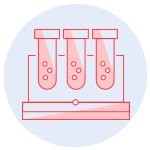 Blood
Blood
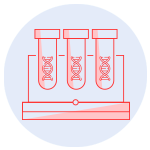 Extracted DNA
Extracted DNA
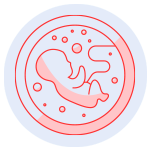
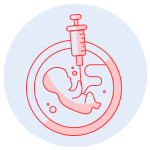 Chorionic villus sampling
Chorionic villus sampling
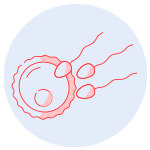 Product of conception (POC)
Product of conception (POC)

